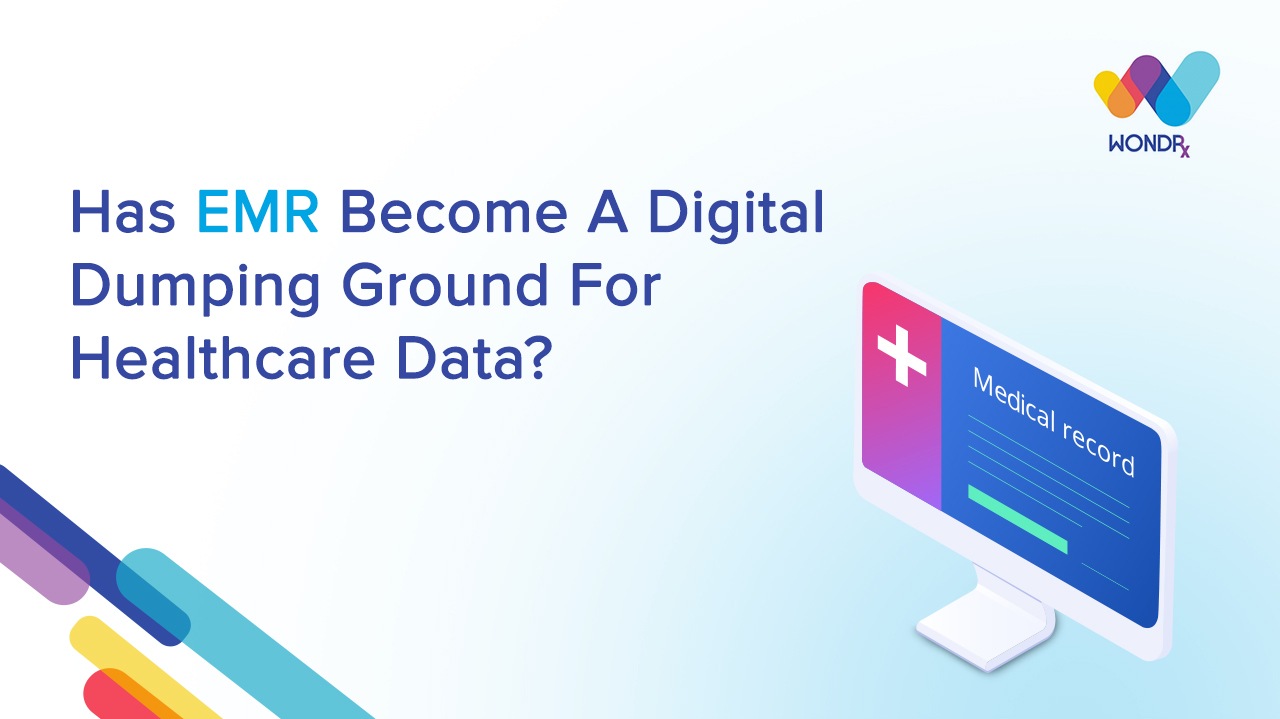Has EMR Become A Digital Dumping Ground For Healthcare Data?

Data churned out in order to be put out for good use is one of the key objectives of Digitization adoption. Isn’t it mind-boggling to think that the amount of data produced in just the last few years has surpassed the amount of data generated in our entire human history? For all this data to be functional, it needs to be processed, stored, and analyzed. However, even today, modern technology is struggling to keep up with the huge volumes of information, leading to poor performance, lost revenues, and wasted time. According to a Forbes report, 95% of businesses are facing issues managing data and are looking for an effective solution.
Healthcare industry is unique but constrained, given the additional sensitivity around medical records related privacy needs. However, anonymized and aggregated clinical data can be put to great use which in turn can speed up medical research and bring out newer therapies much faster to ensure better quality of life for all human beings. Developed economies where EMR adoption has been mandated by respective governments, too, don't put the data to good research use. On the hindsight, we are seeing more resistance from physicians, as they have to invest extra hours in typing the medical records data thus causing burnout. Data is being dumped into huge EMR systems with unutilized potential for research purpose, better outcome purpose etc. and is causing a poor state of creating a digital healthcare dumping ground.
It is important to understand that health data is more than just statistics or numbers; it holds innumerable possibilities and is the key to a futuristic world of healthcare. Inefficient use of medical data can change the course of treatment for a patient, what kind of medical care is provided, and treatment outcomes as well. According to a Deloitte survey, very few organizations use non-health data sources that can be used to augment formal medical data, such as patient lifestyle information, remote monitoring, and survey data about the patient experience.
When a patient visits a doctor or hospital, the questions they’re asked and the treatment they receive become a part of their medical records. When these medical records are anonymized, this information holds immeasurable potential for public benefit, as long as it is used ethically and effectively. Healthcare records, when combined with effective use of technology, ultimately form the evidence for new clinical guidelines, drug development, and government health policy.
It is critical to comprehend two factors here, (a) Are doctors the right people to enter data into EMR systems? Are we creating the most expensive typists out of them?; (b) Are EMRs equipped to process the data and bring out potential success stories out of it?
The Benefits of Utilizing Healthcare Data:
According to the Journal of Ahima, "Healthcare data is analyzed and evaluated from a variety of sources (EHR, insurance claims, cost reports, and patient satisfaction surveys) to help organizations improve the quality of care, lower the cost of services, and enhance patients' end-to-end journey. This data is important in various applications, including how it can be used to drive healthcare quality improvement." Healthcare data can have significant benefits for healthcare organizations, medical staff, and patients alike:
-
Analyzing healthcare data helps in creating profiles of patients, households, and patient groups that provide status for patients' end-to-end journey and enable predictions.
-
Improve patient engagement: Analyzing patient healthcare data can assist doctors in setting reminders and customized suggestions that can be relevant for them, based on predictive modeling.
-
Enhance patient care: Analyzing and studying EMRs can track health trends in certain areas, predict outbreaks and suggest proactive measures to contain them.
-
Help pharma companies: Evaluating healthcare data can help healthcare providers make better data-driven decisions like which drugs are better suited to which region, what equipment to invest in, or which types of patients need to be focused on for marketing products.
-
Analyze doctor activity: Patient healthcare data can be used to understand the success rate of medical practitioners, time invested in different treatments, and medical decisions.
The transition from transaction-oriented to intelligence-oriented
EMR and EHR systems have been heavily used for billing, making the systems transactional, document a visit, retrieve a lab result and send a prescription to the pharmacy. While this system has reduced errors and made it easier to get a proper flow to ensure the clinical order, exquisite transaction support is not enough to address the challenges that impair care delivery.
It is about time to reimagine EHR and EMR systems as smart tools that enhance the utilization of multiple documents, events, and processes rather than just act as an online file cabinet. With advanced technology and innovations, an EMR or EHR system can accomplish so much more! It should help ensure that patient care is evidence-based, identify treatment options, aid in new medical discoveries, and use analytic insights to improve healthcare supply chain operations.
But the data needs to be relevant, accurate, comprehensive, and timely to accomplish such a big impact. Even with high-tech inventions and high-profile campaigns to promote data use, important data often lie unused. It’s time to change that. WONDRx beholds tremendous value in terms of commerce, data insights on disease management, better patient care, and contributes to real-world data generation. The WONDRx Smart Rx Kit has the power to transform the way EMR and EHR systems work!